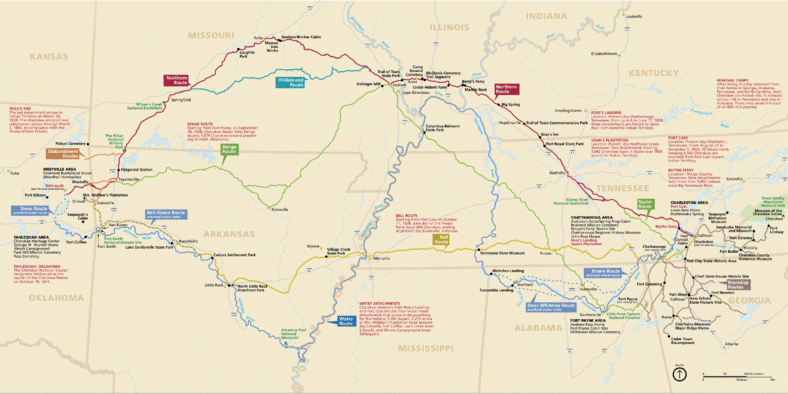Photo: “Trail of Tear” Map. Click here for detailed view.
Immigration Policy and our History of Atrocities against Indigenous People: A Reflection on the 2019 Convocation of Teaching Theologians
Each time I turn on the news, I hear journalists and the people they interview decrying the moment in which our country finds itself. We have allowed racism and bigotry to come to the fore, they say. Our policies against immigrants, such as the infamous family separation policy, express a cruelty that forsakes our history as a nation that welcomes immigrants.
These individuals are right to fear where such rhetoric and policies take us. It should also be noted that our nation’s track record regarding immigrants has not always been one of exemplar hospitality. Additionally, my experience at the Convocation of Teaching Theologians (July 29-31, 2019, Augustana College, Rock Island, IL) brought out a dynamic of the border debacle, one that I had previously disregarded, which complicates the simplistic narrative of the nation that once welcomed immigrants: our country’s historical treatment of indigenous people.
Many Latin Americans who attempt to cross the border into the United States have indigenous heritage. They come from lands and peoples who have been exploited for centuries in order for colonizers, then wealthy landowners, and later corporations to make a profit. A quick study of Latin American history demonstrates the race dynamics at work in this exploitation. White Europeans and their offspring have long drawn benefits from the blood of indigenous people and their descendants. (Eduardo Galeano’s 1971 work Open Veins of Latin American remains an excellent introduction to these realities.)
Meanwhile, on the U.S. side of the border, we build walls through indigenous areas, restricting the movement of people on their ancestral land, separating communities, restricting access to sacred sites, and destroying natural resources. The policy of separating migrant children from the parents or adult guardians who brought them to the boarder eerily echoes the many decades-long policies in the United States that removed Native American children from their homes and sent them away to boarding schools. These practices traumatized the children, stripped them of their cultures, and alienated them from their families and communities.
I am so thankful to Vance Blackfox for drawing my attention to the relationship between the immigration crisis and our historical violence against Native Americans throughout the course of the conference. My own research focuses on the ways colonial structures codified within church polity are a barrier to immigrant integration in congregations. I am drawn to Latin American theologies as a source of wisdom in seeking to decolonize the polity for the sake of immigrants from that region. As move forward in my research, I intend to learn more about the church’s historical treatment of Native Americans, how Native Americans have made a space for themselves in the church in spite of colonial violence, and how we might learn from that experience to discern more equitable polity that makes space for all people, in their fullness, in the body of Christ.








